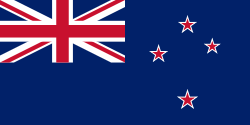| New Zealand at the 1968 Summer Olympics | |
|---|---|
 | |
| IOC code | NZL |
| NOC | New Zealand Olympic and British Commonwealth Games Association |
| Website | www |
| in Mexico City | |
| Competitors | 52 (47 men, 5 women) in 8 sports |
| Flag bearer | Don Oliver (weightlifting) |
| Officials | 16 |
| Medals Ranked 27th |
|
| Summer Olympics appearances (overview) | |
| Other related appearances | |
New Zealand at the 1968 Summer Olympics was represented by a team of 52 competitors, 47 men and five women, who took part in 26 events across eight sports. [1] Selection of the team for the Games in Mexico City, Mexico, was the responsibility of the New Zealand Olympic and British Commonwealth Games Association. New Zealand's flagbearer at the opening ceremony was Don Oliver. The New Zealand team finished 27th on the medal table, winning a total of three medals, one of which was gold.
